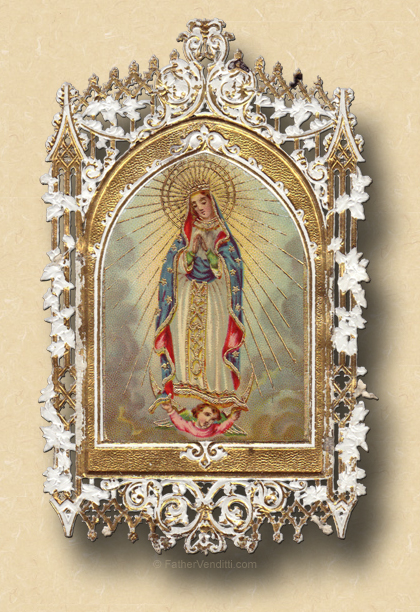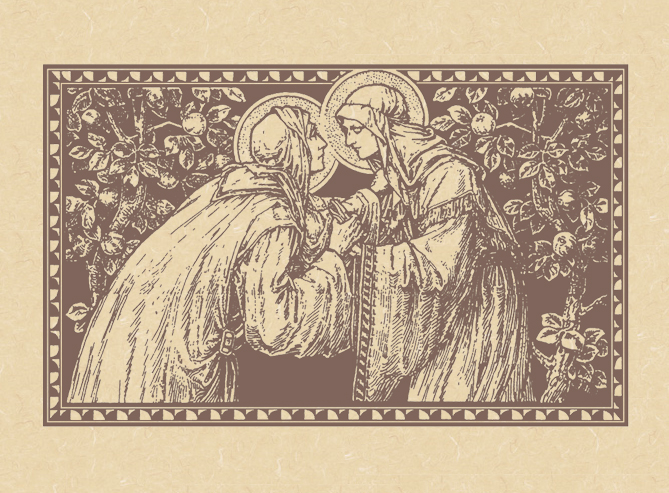I Have the Need … the Need for Speed.
In the United States:
The Feast of Our Lady of Guadalupe.*
Lessons from the proper, according to the ordinary form of the Roman Rite:
• Zechariah 2: 14-17.
[or, Revelation 11: 19; 12: 1-6, 10.]
• [Responsorial] Judith 13: 18-19.
• Luke 1: 26-38.
[or, Luke 1: 39-47.]**
|
Outside the United States:
The Second Wednesday of Advent.
Lessons from the feria, according to the ordinary form of the Roman Rite:
• Isaiah 40: 25-31.
• Psalm 103: 1-4, 8, 10.
• Matthew 11: 28-30.
|
The Third Class Feast of the Blessed Virgin Mary of Guadalupe; and, the Commemoration of the Second Wednesday of Advent.***
Lessons from the proper, according to the extraordinary form of the Roman Rite:
• Eccesiasticus 24: 23-31.
• Canticles 6: 9.
• Luke 1: 39-47.
|
Outside the United States:
The Second Wednesday of Advent.
Lessons from the dominica,† according to the extraordinary form of the Roman Rite:
• Romans 15: 4-13.
• Psalm 49: 2-3, 5.
• Matthew 11: 2-10.
|
FatherVenditti.com
|
 7:01 AM 12/12/2018 — It’s hard to believe that it’s been six centuries since the Mother of God appeared to Saint Juan, and asked him to advocate for the building of a shrine to manifest Her love for all mankind. Now, the Basilica of Our Lady of Guadalupe is the most popular pilgrimage destination in North America, and the miraculous image our Blessed Mother imprinted on Saint Juan’s tilma is one of the most venerated images in the Catholic world. 7:01 AM 12/12/2018 — It’s hard to believe that it’s been six centuries since the Mother of God appeared to Saint Juan, and asked him to advocate for the building of a shrine to manifest Her love for all mankind. Now, the Basilica of Our Lady of Guadalupe is the most popular pilgrimage destination in North America, and the miraculous image our Blessed Mother imprinted on Saint Juan’s tilma is one of the most venerated images in the Catholic world.
The Roman Missal offers us two different Gospel lessons from which to choose on this wonderful feast, both from Saint Luke: one, his account of the Annunciation, and the other his account of the Visitation, which is the one I chose, though I would have loved to have both.
At the Annunciation, our Blessed Mother received the news that She would be the Mother of the Savior, but included in Gabriel's message to Her is the news that Her cousin is expecting. Our Lady knows that Elizabeth is quite a bit older than She is, and we all know that a pregnancy in a woman's older years can be precarious and difficult, especially for someone who has not had children before. As the lesson we just heard begins, the very intuitive Saint Luke reports to us: “In the days that followed, Mary rose up and went with all haste to a town of Judah, in the hill country…” (1: 39 Knox).
I wish I had the time to explain the careful attention that the Blessed Evangelist Luke gave to this first chapter of his Gospel, his marvelous facility with the Greek language with which he was raised, and his attention to the meaning of every word he uses. And there is one word in this opening verse that deserves our attention: σπουδῆς, an adverb taken from the verb σπεύδω meaning “to hasten,” from which we get our word “speed.”  Our Lady proceeds “in haste.” She puts all she has at God's disposal. In an instant, all her personal plans—and no doubt she had many—were discarded so that She could do everything God wanted. She made no excuses, had no reservations, and wastes no time; but consider what She wastes no time to do. Our Lady proceeds “in haste.” She puts all she has at God's disposal. In an instant, all her personal plans—and no doubt she had many—were discarded so that She could do everything God wanted. She made no excuses, had no reservations, and wastes no time; but consider what She wastes no time to do.
Among the few episodes of the Gospel that refer to Her, two of them speak directly of Her attention to the needs of others. Right after receiving from Gabriel what had to be striking news for Her, She runs full steam to Her cousin to help her during what She obviously reasoned would be a difficult pregnancy for someone so up in years. Later, She would express concern to Her Son for the young couple and their guests at the wedding in Cana. Such is the temperament and solicitousness of Someone conceived without sin, without a selfish bone in Her body. No doubt Her neighbors in Nazareth could have told us about Her many little services to them over the years.
In Mary we find the truth that generosity is the virtue of great souls. Most of us, when we receive startling news that potentially changes our lives completely, retreat into ourselves: whatever we may be doing for others is put on hold because now we are the ones in need, and we look to others to give us support and consolation for a change; but, not our Blessed Mother. With haste—without a moment's hesitation—right on the heals of being told how every hope and dream for Her own future was now turned upside down, She blasts off to Her cousins house to help. Don't think for a moment that this is a natural inclination on Her part; remember, She's a human being like the rest of us, and this decision to run to Elizabeth in her need was a conscious act. Pope Saint John Paul II once said:
Far from being an instinctive inclination, love is a conscious decision of the will to draw close to other people. To be able to love truly it is important to be detached from everything and, especially, from self, to give gratuitously.… This detachment from self is the source of a balanced personality. It is the secret of happiness (Address of June 1, 1980).
Today, let us ask the Mother of God to teach us to be generous, first of all with God, then with others, starting with those with whom we live and work in the various circumstances of our lives. She will show us to set aside our own needs in favor of the needs of those around us, thus showing us that the path to true happiness lies in putting ourselves aside, as Her own Son would later say: “…He who tries to save his life will lose it; it is the man who loses his life for my sake, that will save it.” (Luke 9: 24 Knox).

* Personal note: today's feast marks the 32nd anniversary of my ordination to the diaconate at Sacred Heart Church in South Amboy, New Jersey, along with two of my classmates. The three of us were later attached to a class of ten for ordination to the priesthood the following May. Of the three, I am the only survivor.
** The Ordo for the Archdioceses of Baltimore, MD, Washington, DC, and the Military Services, as well as the Diocese of Wilmington, DL (suffragan of Baltimore) indicates that any lessons from the common of the Blessed Virgin Mary may also be taken; but, the Missal itself makes no mention of this option. This ordo does not cover the Diocese of St. Thomas in the Virgin Islands, suffragan of Washington.
*** In the extraordinary form, when a third class feast falls within a privileged season, the feria is commemorated by an additional Collect, Secret and Postcommunion added to those of the feast. Note that a third class feast in the extraordinary form is concomitant with a memorial in the ordinary form; thus, this feast has been promoted in the US in the ordinary form. For more information about how the ranks of liturgical observances correspond between the two forms, cf. the post here.
† On most ferias in the extraordinary form the lessons come from the previous Sunday.
|

